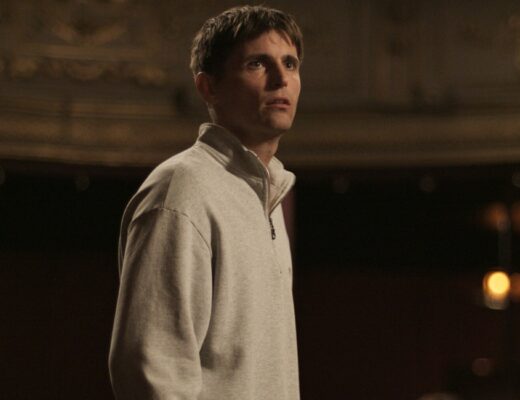Stanley Kwan has never achieved the same level of critical renown here in America as his countryman Wong Kar-wai, which seems most certainly in large part is due to his sporadic (at best) distribution record: Center Stage (aka Actress), generally considered his greatest film and a key work of 1980s Hong Kong cinema, was initially released with almost 30 minutes cut from its original runtime, while Kwan’s more recent films have either never been distributed at all or, like Rouge and Lan Yu, have never been released on any home video format, after only brief theatrical runs. Thankfully, things appear to be changing for the better. Center Stage was just recently restored and re-released in a new, hi-def digital edition — and now Lan Yu has received its own restoration, in honor of the film’s 20th anniversary.
One of the few openly gay filmmakers in Hong Kong, Kwan has frequently mined the tangled history of Chinese cinema for both melodramatic and political ends. 2001’s Lan Yu, based on an anonymously published, sexually explicit novel that appeared on the internet in 1998, was an independent production that shot in Shanghai without Chinese government approval and never officially opened in the mainland, despite a Hong Kong release (albeit slapped with a Category III rating) and a win for Best Picture at Taiwan’s Golden Horse awards. The film charts a turbulent decade of social turmoil and seismic economic shifts, as refracted through a tumultuous on-off love affair between older, wealthy businessman Han Dong (Hu Jun) and the much younger Lan Yu (Liu Ye), who we first meet as a poor college student. Han is used to no-strings-attached trysts, showering his lovers with gifts until he tires of them. But Lan is different, his youthful innocence and beguiling presence gradually wearing down Han’s stony facade. The pair seem to represent two different perspectives on homosexuality; the older man, who has erected emotional barriers after decades of hiding his true feelings, and a younger generation who has yet to be disillusioned by an oppressive, prejudiced society. Thankfully, Kwan doesn’t force that symbolism too much, instead allowing both men to become fully fledged characters rather than mere schematic signposts.
There’s a careful, precise visual scheme at work here, as Kwan favors subdued pastel colors and slightly cramped interiors that keep multiple figures in the frame simultaneously. He also makes careful use of mirrors, constructing images that bisect or otherwise separate Han and Lan within the same shot. In a very literal sense, they are apart even when together, a key visual representation of their relationship. Kwan also creates a stripped down narrative through-line that emphasizes specific, crystallized moments — while otherwise eliding huge chunks of narrative time with sudden, drastic ellipses. After the men have their first argument, a single cut jumps ahead an undisclosed amount of time, leaving the audience unaware of time passed until Han tells an employee that he hasn’t seen or spoken to Lan in ages. Eventually, the pair reunite, as Han rescues Kan from the authorities in the aftermath of the Tiananmen Square massacre — an obviously epochal event here mentioned only in passing, but treated as the source of Lan’s emotional trauma. Whereas the Tiananmen Square protests represent a narrative turning point in something like Lou Ye’s Summer Palace — inevitably bifurcating that film into a before-and-after structure — Kwan opts for a more elusive sense of historicity.
There’s a subtle recognition that the personal is the political, and that we are all subject to the vicissitudes of our era, but also that these larger structural events are ultimately subsumed by the mundane drama of human relationships. The second half of Lan Yu finds Han marrying a woman, and ending his affair with Lan yet again; after an undetermined amount of time (the dissolution of Han’s heterosexual relationship and eventual divorce is once again elided in a single edit), Han is arrested for shady business practices and tossed in prison. Lan bails him out, and freed from the pressures of commerce and keeping up appearances, they seem to find a peaceful equilibrium. The film ends with a sudden death, which has been criticized as needlessly dramatic and an example of a filmmaker ‘punishing’ their characters for being gay. And there’s some truth there, but it’s also important to note that the death occurs because of a construction accident, suggesting the human cost of China’s booming economic growth at the end of the 20th Century. As the film resurfaces in this new decade, it’s also hard not to think of the recent unrest in Hong Kong, as the brutal suppression of pro-democracy demonstrations in 2020 can’t help but mirror Tiananmen, as well as the just -announced retroactive censorship of decades of Hong Kong cinema. Kwan’s pessimism was simply prescient.
Published as part of CineCina Film Festival 2021.







